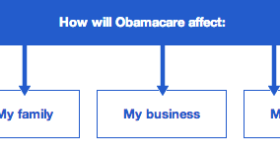Ever since the Affordable Care Act passed, health policy makers have been comparing it to another moment in history — Medicare.
It’s been almost 50 years since President Lyndon Johnson signed Medicare into law. And under the law, almost 19 million people aged 65 and older had new medical coverage.
"Half the aged did not have health insurance coverage, and the half that did have health insurance coverage had very poor coverage," said Dorothy Rice, who was a director of health insurance research at the Social Security Administration when Medicare was created. She’s now 91 years old.
“We were all told in the social security administration that we should come to work on that weekend when Medicare went into effect because we were going to have the doors knocked down by all these elderly sick people," Rice said. "And you know what happened? Nothing. Absolutely nothing.”
Rice said Medicare started smoothly — there were no implementation delays. She said enrolling in Medicare was simple. Eligible people were automatically signed up for hospital care. And to elect medical coverage, they signed a pre-printed card they received in the mail. Rice said the new federal law will not be that simple.
“Now that individual has to sign up, choose a plan, the best plan that they can get for the amount of money they’re willing to pay. And if they don’t sign up, they’ll be penalized.”
Enrollment may be more complex than early Medicare, but Rice and others say, it’s crucial that everyone signs up if the new system is to work properly.
“Imagine if everybody simply waited until their house caught on fire then called up the insurance company and said you must sell me an insurance policy right now," said Jonathan Engel, professor at Baruch College. He wrote a book about the history of Medicaid.
“Clearly the insurance company's going to go out of business in three minutes, right? You can’t just insure houses that are already on fire," Engel explained. "You have to have people buying in before their house catches on fire."
Engel said this national health overhaul has other challenges. Medicare overcame initial opposition from physicians, but the resistance to the Affordable Care Act is unprecedented.
"I think we’re at almost a unique moment in our political history, the level of divisiveness and anger and hatred and distrust between the two ends of the political spectrum. This is not where a lot of us are trying to get together to do something difficult. This is where we have some people who are actively trying to make something that would naturally be difficult become more difficult."
Engel said people are largely uninformed, and are being given misinformation about the law. He said the sheer complexity of the health exchanges is enough to scare people away too.
Buying health insurance is complicated, even for highly informed, sophisticated people. And for someone who isn’t used to having health insurance, trying to figure out bronze, deductibles, these are complicated problems.
But Engel said it will take years to evaluate the success of the new program. Dorothy Rice said California’s implementation of the law may go more smoothly, because of the state’s rigorous efforts. But she hopes eventually the national health care system will look more like Medicare.
"We were sure that when Medicare was enacted, it wouldn’t be long until we would have national health insurance but that never came to being until the 2010 Affordable Care Act," Rice said.
The open enrollment period begins Oct. 1, and lasts through March 31, 2014.







